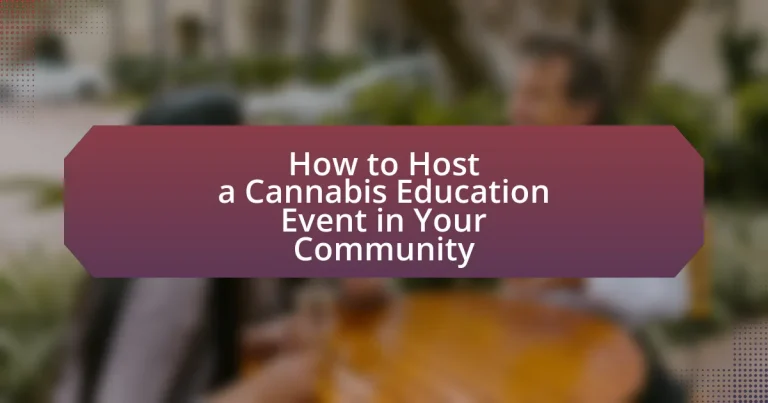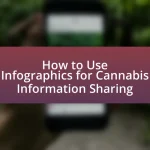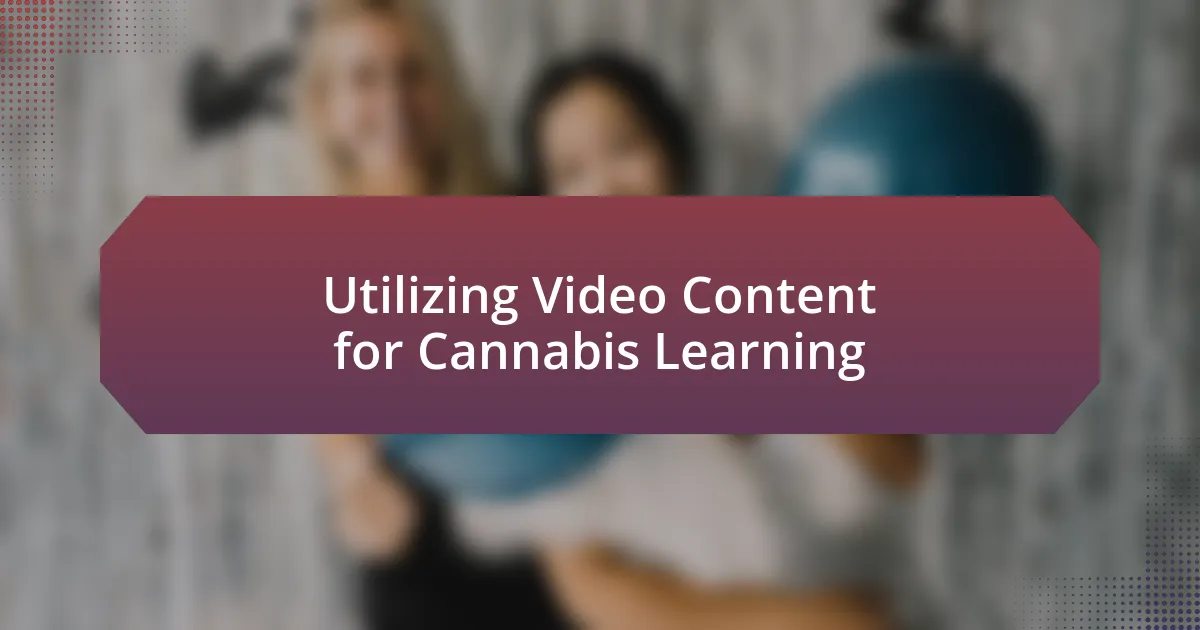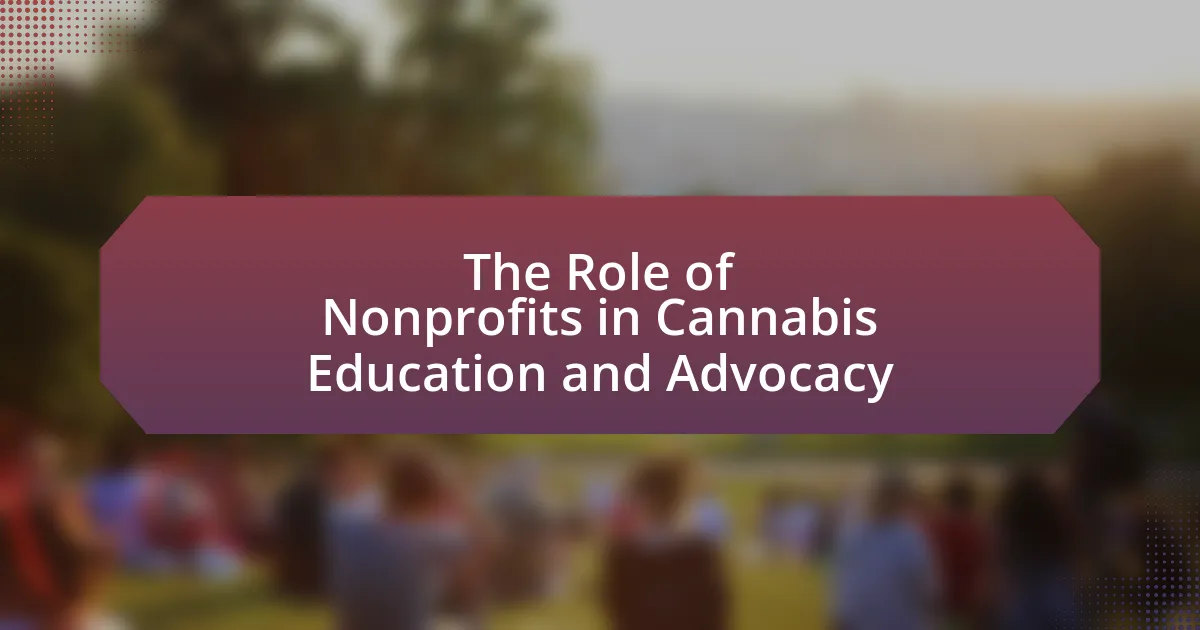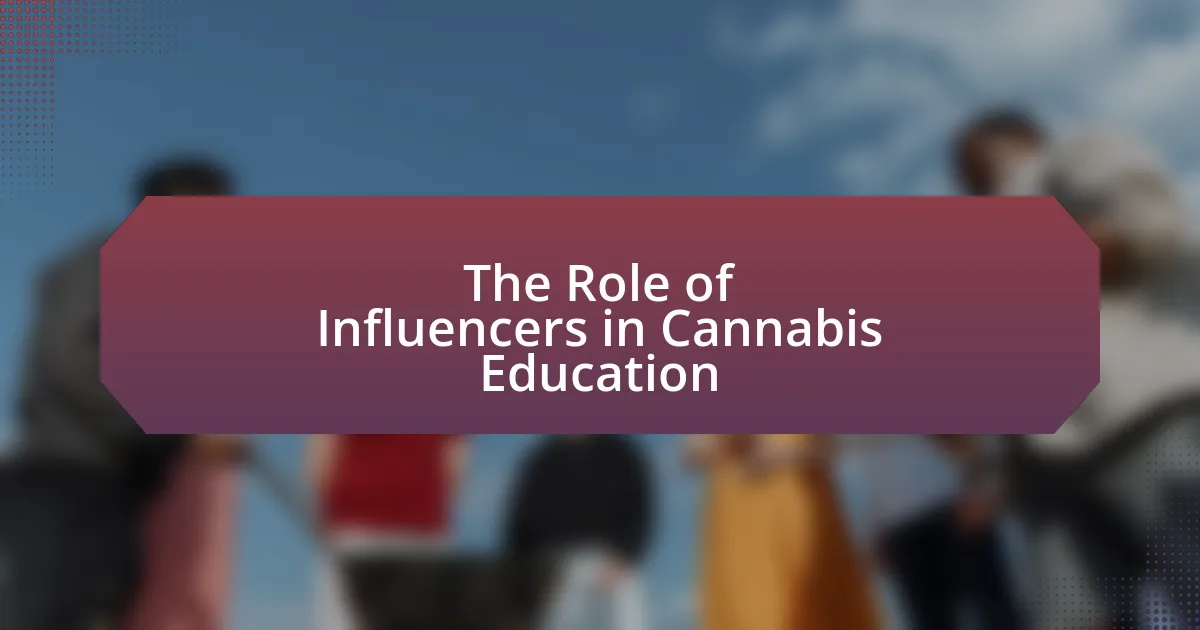A Cannabis Education Event is a gathering aimed at educating participants about cannabis, covering its uses, benefits, legal status, and health implications. These events are crucial for communities as they provide essential information that helps dispel myths, reduce stigma, and promote informed decision-making regarding cannabis use. The article outlines the importance of these events, the topics typically covered, and the demographics most likely to attend. It also details the planning process, including identifying the target audience, selecting a venue, and promoting the event effectively, while emphasizing the need for diverse perspectives and accurate information dissemination to enhance community awareness and engagement.
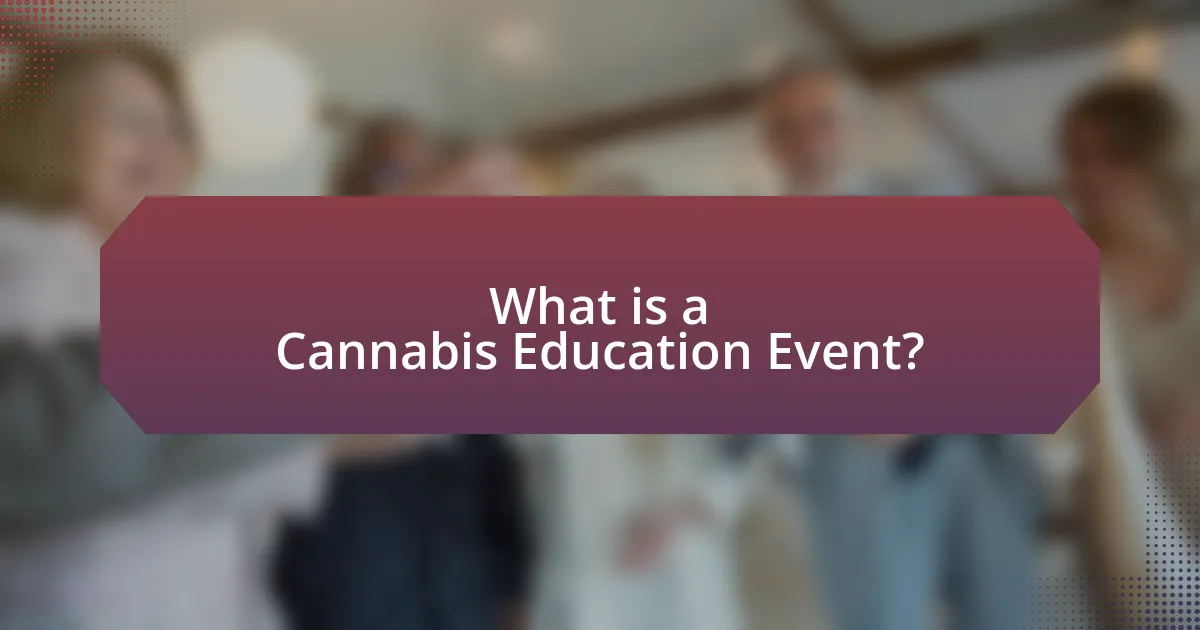
What is a Cannabis Education Event?
A Cannabis Education Event is a gathering designed to inform participants about cannabis-related topics, including its uses, benefits, legal status, and health implications. These events often feature expert speakers, workshops, and discussions aimed at increasing awareness and understanding of cannabis. Research indicates that educational initiatives can significantly enhance public knowledge and reduce stigma associated with cannabis use, as evidenced by studies showing improved perceptions of cannabis among attendees after such events.
Why are Cannabis Education Events important for communities?
Cannabis education events are important for communities because they provide essential information about the benefits and risks associated with cannabis use. These events facilitate informed decision-making among community members, helping to dispel myths and reduce stigma surrounding cannabis. Research indicates that education can lead to safer consumption practices and better understanding of legal regulations, which is crucial as more regions legalize cannabis. For example, a study published in the Journal of Cannabis Research found that educational interventions significantly improved knowledge and attitudes towards cannabis among participants. Thus, cannabis education events play a vital role in promoting public health and safety within communities.
What topics are typically covered in these events?
Cannabis education events typically cover topics such as the legal status of cannabis, its medical benefits, responsible usage, cultivation techniques, and the impact of cannabis on health and wellness. These subjects are essential for informing attendees about the complexities of cannabis, including its effects, potential risks, and the importance of compliance with local laws. For instance, discussions often include the differences between THC and CBD, methods of consumption, and the latest research findings on cannabis use.
How do these events contribute to community awareness?
Cannabis education events contribute to community awareness by providing accurate information about cannabis, its uses, and its effects. These events facilitate open discussions, dispel myths, and promote understanding of cannabis-related issues, which is crucial in communities where misinformation may prevail. For instance, a study by the National Institute on Drug Abuse indicates that educational initiatives can significantly reduce stigma and increase knowledge about cannabis, leading to informed decision-making among community members.
Who can benefit from attending a Cannabis Education Event?
Individuals interested in understanding cannabis, including patients, caregivers, healthcare professionals, and community members, can benefit from attending a Cannabis Education Event. Patients seeking information about medical cannabis can learn about its uses, benefits, and potential side effects. Caregivers can gain insights into how to support patients effectively. Healthcare professionals can enhance their knowledge of cannabis to provide informed guidance to patients. Community members can educate themselves on cannabis laws, safety, and responsible use, fostering informed discussions within their communities. These events often feature expert speakers and provide evidence-based information, making them valuable resources for anyone looking to deepen their understanding of cannabis.
What demographics are most likely to attend?
Adults aged 21 to 40 are the demographics most likely to attend cannabis education events. This age group typically shows a higher interest in cannabis-related topics, as evidenced by surveys indicating that 60% of cannabis users fall within this range. Additionally, individuals with higher education levels and those living in urban areas are more inclined to participate, reflecting trends in cannabis acceptance and knowledge-seeking behavior.
How can different community members engage with the content?
Different community members can engage with the content by participating in discussions, sharing personal experiences, and providing feedback during the cannabis education event. Engaging in discussions allows members to ask questions and clarify doubts, fostering a collaborative learning environment. Sharing personal experiences can enrich the content by adding diverse perspectives, while providing feedback helps organizers improve future events. Research indicates that active participation enhances retention of information, making the engagement more effective.

How to Plan a Cannabis Education Event?
To plan a cannabis education event, first identify the target audience and their specific educational needs regarding cannabis. This involves researching local laws, community interests, and potential misconceptions about cannabis use. Next, secure a suitable venue that complies with local regulations and can accommodate the expected number of attendees.
Then, develop a comprehensive agenda that includes expert speakers, interactive workshops, and Q&A sessions to engage participants effectively. Promote the event through various channels, such as social media, community boards, and local organizations, to maximize attendance.
Finally, gather feedback post-event to assess its impact and improve future events. According to a study published in the Journal of Cannabis Research, educational events significantly increase knowledge and reduce stigma surrounding cannabis use, highlighting the importance of well-structured educational initiatives.
What are the key steps in organizing a successful event?
The key steps in organizing a successful event include defining the event’s purpose, creating a detailed plan, securing a venue, promoting the event, and executing logistics effectively. Defining the event’s purpose ensures clarity on objectives, such as educating the community about cannabis. A detailed plan outlines timelines, budgets, and responsibilities, which are crucial for smooth execution. Securing a venue that accommodates the expected audience and aligns with the event’s theme is essential for accessibility and comfort. Promotion through various channels, including social media and local partnerships, increases attendance and engagement. Finally, executing logistics, such as catering, audio-visual needs, and attendee registration, ensures a seamless experience for participants. These steps are supported by event management best practices, which emphasize thorough planning and community engagement as critical factors for success.
How do you determine the target audience for the event?
To determine the target audience for a cannabis education event, conduct demographic research and analyze community interests. This involves identifying age groups, professions, and interests related to cannabis, such as health, wellness, or legal aspects. For instance, surveys or community feedback can reveal that individuals aged 25-45 are more likely to engage in cannabis education due to increased interest in wellness trends. Additionally, collaborating with local cannabis advocacy groups can provide insights into the specific needs and preferences of potential attendees, ensuring the event content aligns with their interests.
What resources are needed for planning and execution?
To effectively plan and execute a cannabis education event in your community, essential resources include a budget, venue, promotional materials, knowledgeable speakers, and legal permits. A budget ensures financial feasibility, while a suitable venue accommodates attendees and activities. Promotional materials, such as flyers and social media posts, help attract participants. Knowledgeable speakers provide credible information, enhancing the event’s value. Lastly, obtaining legal permits ensures compliance with local regulations, which is crucial for the event’s legitimacy and success.
How do you choose the right venue for the event?
To choose the right venue for a cannabis education event, assess the venue’s capacity, accessibility, and compliance with local regulations regarding cannabis-related activities. The venue must accommodate the expected number of attendees comfortably, ensuring that it is accessible to individuals with disabilities. Additionally, it is crucial to verify that the venue adheres to local laws governing cannabis events, as some jurisdictions have specific restrictions on where cannabis-related discussions can take place. For instance, venues that are licensed for public gatherings and have experience hosting similar events are often more suitable.
What factors should be considered when selecting a location?
When selecting a location for a cannabis education event, factors such as accessibility, legal compliance, safety, and capacity must be considered. Accessibility ensures that attendees can easily reach the venue, which is crucial for maximizing participation. Legal compliance involves confirming that the location adheres to local regulations regarding cannabis-related events, as laws vary significantly by jurisdiction. Safety includes evaluating the neighborhood and venue security to provide a secure environment for attendees. Capacity refers to the space available to accommodate the expected number of participants comfortably, which is essential for effective engagement and interaction during the event.
How can accessibility be ensured for all attendees?
Accessibility can be ensured for all attendees by implementing various strategies such as providing wheelchair access, offering sign language interpretation, and ensuring materials are available in multiple formats. These measures cater to individuals with physical disabilities, hearing impairments, and those who require alternative reading formats, respectively. According to the Americans with Disabilities Act (ADA), public events must be accessible to individuals with disabilities, which includes physical access to venues and the provision of necessary accommodations. By adhering to these guidelines, event organizers can create an inclusive environment that allows all attendees to participate fully.

What Content Should Be Included in the Event?
The content that should be included in a cannabis education event encompasses educational presentations, expert panels, interactive workshops, and resource distribution. Educational presentations should cover the basics of cannabis, including its history, types, and effects, while expert panels can provide insights from medical professionals, legal experts, and industry leaders. Interactive workshops allow participants to engage in hands-on learning about cultivation, consumption methods, and responsible use. Additionally, distributing resources such as brochures, pamphlets, and access to local cannabis-related services enhances the educational experience and provides attendees with valuable information for further exploration.
How do you select speakers and presenters for the event?
To select speakers and presenters for the event, organizers evaluate candidates based on their expertise in cannabis education, public speaking skills, and relevance to the event’s theme. This process often includes reviewing the speaker’s background, previous speaking engagements, and audience engagement metrics. For instance, speakers with a proven track record in cannabis research or advocacy can provide credible insights, enhancing the educational value of the event. Additionally, feedback from past events can inform the selection process, ensuring that presenters resonate well with the target audience.
What qualifications should speakers have?
Speakers should have expertise in cannabis-related topics, including legal, medical, and social aspects. This expertise can be demonstrated through formal education, such as degrees in fields like pharmacology, medicine, or law, as well as practical experience in the cannabis industry. For instance, speakers with a background as healthcare professionals or legal advisors specializing in cannabis law provide credible insights. Additionally, certifications from recognized cannabis education programs can further validate a speaker’s qualifications, ensuring they possess up-to-date knowledge and understanding of current regulations and research.
How can you ensure diverse perspectives are represented?
To ensure diverse perspectives are represented in a cannabis education event, actively engage a variety of community stakeholders, including local advocacy groups, healthcare professionals, and individuals from different cultural backgrounds. This approach fosters inclusivity and ensures that multiple viewpoints are considered. Research indicates that diverse teams make better decisions, as highlighted in a study by McKinsey & Company, which found that organizations with greater diversity are 35% more likely to outperform their peers in profitability. By incorporating diverse voices, the event can address a broader range of concerns and insights related to cannabis education, ultimately enriching the community dialogue.
What types of educational materials should be provided?
Educational materials for a cannabis education event should include brochures, informational pamphlets, visual aids, and digital resources. Brochures and pamphlets can provide concise information about cannabis laws, health effects, and responsible usage, while visual aids like infographics can simplify complex data for better understanding. Digital resources, such as websites or online courses, can offer in-depth knowledge and updates on cannabis research and legislation. These materials are essential for effectively educating attendees and ensuring they have access to accurate and relevant information.
How can handouts and resources enhance the learning experience?
Handouts and resources enhance the learning experience by providing structured information that reinforces key concepts. They serve as tangible references that learners can consult during and after educational sessions, facilitating better retention of knowledge. Research indicates that learners who engage with supplementary materials, such as handouts, demonstrate improved comprehension and recall, as these resources cater to various learning styles. For instance, a study published in the Journal of Educational Psychology found that students who utilized handouts scored significantly higher on assessments compared to those who did not. This evidence underscores the effectiveness of handouts and resources in promoting an enriched educational environment.
What interactive elements can be included to engage attendees?
Interactive elements that can be included to engage attendees at a cannabis education event are live polls, Q&A sessions, hands-on demonstrations, and breakout discussions. Live polls allow attendees to share their opinions in real-time, fostering engagement and interaction. Q&A sessions provide opportunities for attendees to ask questions directly to experts, enhancing their understanding of cannabis topics. Hands-on demonstrations, such as cooking with cannabis or using different consumption methods, create an immersive experience that encourages participation. Breakout discussions enable smaller groups to delve deeper into specific topics, promoting dialogue and community building among attendees. These interactive elements have been shown to increase attendee satisfaction and retention of information, making events more impactful.
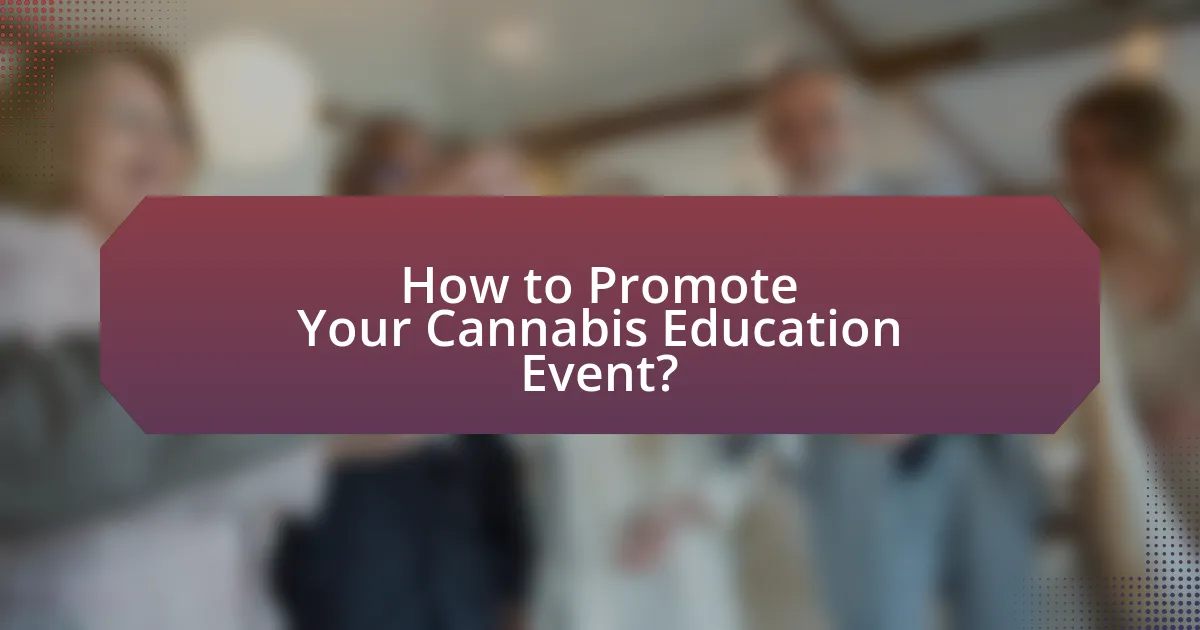
How to Promote Your Cannabis Education Event?
To promote your cannabis education event, utilize social media platforms, local community boards, and partnerships with cannabis-related businesses. Social media allows for targeted advertising and engagement with potential attendees, while community boards can reach local residents interested in cannabis education. Collaborating with cannabis businesses can enhance credibility and expand your audience through their existing customer base. According to a study by the Pew Research Center, 55% of Americans support cannabis legalization, indicating a growing interest in cannabis-related topics, which can be leveraged to attract attendees to your event.
What marketing strategies are effective for reaching your audience?
Effective marketing strategies for reaching your audience include targeted social media advertising, community partnerships, and content marketing. Targeted social media advertising allows you to reach specific demographics interested in cannabis education, as platforms like Facebook and Instagram offer detailed targeting options based on interests and behaviors. Community partnerships with local businesses or organizations can enhance credibility and expand your reach, as these entities often have established trust within the community. Content marketing, such as informative blog posts or videos about cannabis education, can engage your audience and position you as a knowledgeable resource. According to a 2021 survey by the Cannabis Marketing Association, 70% of cannabis consumers prefer educational content, highlighting the effectiveness of these strategies in reaching and engaging your audience.
How can social media be utilized for promotion?
Social media can be utilized for promotion by creating targeted campaigns that engage specific audiences interested in cannabis education. Platforms like Facebook, Instagram, and Twitter allow event organizers to share informative content, such as event details, educational materials, and interactive posts that encourage community participation. According to a 2021 report by Statista, 54% of social media users utilize these platforms to discover events, highlighting their effectiveness in reaching potential attendees. Additionally, leveraging hashtags and local groups can enhance visibility and foster community engagement, making social media a powerful tool for promoting cannabis education events.
What role do local partnerships play in event visibility?
Local partnerships significantly enhance event visibility by leveraging community networks and resources. Collaborating with local businesses, organizations, and influencers allows for broader outreach, as these partners can promote the event through their established channels, reaching a more extensive audience. For instance, a study by the Event Marketing Institute found that events with local partnerships saw a 30% increase in attendance compared to those without. This demonstrates that local partnerships not only amplify promotional efforts but also foster community engagement, making the event more relevant and appealing to local attendees.
How can you measure the success of your event?
You can measure the success of your event by evaluating attendance numbers, participant feedback, and engagement levels. Attendance numbers provide a quantitative measure of interest and reach, while participant feedback, often gathered through surveys, offers qualitative insights into the event’s impact and areas for improvement. Engagement levels can be assessed through social media interactions, questions asked during the event, and follow-up actions taken by attendees, such as signing up for newsletters or joining community groups. For instance, a successful cannabis education event might aim for at least 100 attendees, receive an average feedback score of 4 out of 5, and generate significant social media engagement, indicating that the event met its educational goals and resonated with the community.
What metrics should be tracked to evaluate impact?
To evaluate the impact of a cannabis education event, key metrics to track include attendee engagement, knowledge retention, and behavioral change. Attendee engagement can be measured through participation rates, feedback surveys, and social media interactions, indicating how well the event resonated with the audience. Knowledge retention can be assessed through pre- and post-event quizzes, demonstrating the effectiveness of the educational content delivered. Behavioral change can be tracked by monitoring follow-up surveys that assess changes in attitudes or actions related to cannabis use, providing insight into the long-term impact of the event. These metrics collectively offer a comprehensive view of the event’s effectiveness in educating the community.
How can feedback from attendees be collected and analyzed?
Feedback from attendees can be collected through surveys, interviews, and feedback forms distributed during or after the event. Surveys can be conducted using online platforms like Google Forms or SurveyMonkey, allowing for quantitative data collection through multiple-choice questions and qualitative insights through open-ended questions. Interviews can provide deeper insights and can be conducted in person or via phone or video calls. Feedback forms can be handed out at the event, ensuring immediate responses while the experience is fresh.
To analyze the collected feedback, data can be aggregated and categorized to identify trends and common themes. Quantitative data can be analyzed using statistical methods to measure satisfaction levels, while qualitative data can be coded for recurring comments or suggestions. This approach allows event organizers to understand attendee experiences and make informed improvements for future events.
What are some best practices for hosting a Cannabis Education Event?
To host a successful Cannabis Education Event, it is essential to ensure accurate information is presented by qualified speakers. Engaging knowledgeable experts, such as licensed professionals or researchers, enhances credibility and provides attendees with reliable insights. Additionally, creating an inclusive environment encourages participation; this can be achieved by offering diverse topics that cater to various audience interests, such as medical uses, legal aspects, and cultivation techniques.
Promoting the event through multiple channels, including social media, community boards, and local businesses, increases visibility and attendance. Furthermore, providing resources, such as pamphlets or access to online materials, allows attendees to continue their education beyond the event. Lastly, gathering feedback through surveys post-event helps organizers improve future events and better meet community needs.
How can you create an inclusive and welcoming environment?
To create an inclusive and welcoming environment for a cannabis education event, ensure diverse representation among speakers and participants. This can be achieved by actively inviting individuals from various backgrounds, including different ethnicities, genders, and experiences with cannabis. Research indicates that diverse teams lead to more innovative solutions and better engagement, as highlighted in a study by McKinsey & Company, which found that companies in the top quartile for gender diversity are 21% more likely to outperform on profitability. Additionally, establish clear guidelines for respectful communication and provide resources for attendees to understand the cultural significance of cannabis in different communities. This approach fosters a sense of belonging and encourages open dialogue, ultimately enhancing the educational experience for all participants.
What common challenges should be anticipated and addressed?
Common challenges that should be anticipated and addressed when hosting a cannabis education event include legal compliance, community stigma, and accurate information dissemination. Legal compliance is crucial, as regulations surrounding cannabis vary significantly by location; failing to adhere to these laws can result in penalties. Community stigma may deter attendance or participation, necessitating strategies to foster a welcoming environment. Accurate information dissemination is vital to counter misinformation and ensure attendees receive reliable, science-based content. Addressing these challenges proactively can enhance the event’s effectiveness and community impact.
